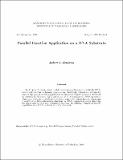Parallel Function Application on a DNA Substrate
| dc.contributor.author | Blumberg, Andrew Justin | en_US |
| dc.date.accessioned | 2004-10-04T14:15:46Z | |
| dc.date.available | 2004-10-04T14:15:46Z | |
| dc.date.issued | 1996-12-01 | en_US |
| dc.identifier.other | AIM-1588 | en_US |
| dc.identifier.uri | http://hdl.handle.net/1721.1/5942 | |
| dc.description.abstract | In this paper I present a new model that employs a biological (specifically DNA -based) substrate for performing computation. Specifically, I describe strategies for performing parallel function application in the DNA-computing models described by Adelman, Cai et. al., and Liu et. al. Employing only DNA operations which can presently be performed, I discuss some direct algorithms for computing a variety of useful mathematical functions on DNA, culminating in an algorithm for minimizing an arbitrary continuous function. In addition, computing genetic algorithms on a DNA substrate is briefly discussed. | en_US |
| dc.format.extent | 14 p. | en_US |
| dc.format.extent | 265794 bytes | |
| dc.format.extent | 210981 bytes | |
| dc.format.mimetype | application/postscript | |
| dc.format.mimetype | application/pdf | |
| dc.language.iso | en_US | |
| dc.relation.ispartofseries | AIM-1588 | en_US |
| dc.subject | AI | en_US |
| dc.subject | MIT | en_US |
| dc.subject | Artificial Intelligence | en_US |
| dc.subject | DNA Computing | en_US |
| dc.subject | Parallel Architecture | en_US |
| dc.title | Parallel Function Application on a DNA Substrate | en_US |
